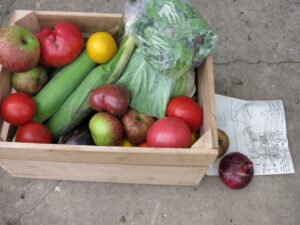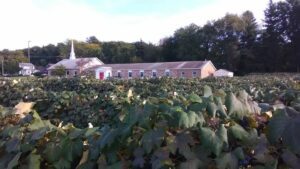In late April this year LAMPa joined with United Lutheran Seminary in the celebration of rogation. ULS’s spring convocation around the theme “The Theology of Gathering” helped Lutherans across Pennsylvania think about the ways in which we are connected, even as we distanced ourselves due to the COVID-19 pandemic. In recognizing this theme, and seeking to honor creation as spring bloomed, LAMPa staff facilitated the gathering of soils from across the commonwealth. These soil samples represented farms, gardens, parks, polluted waters, and more, and were shared with synods who later blessed them in rogation services held throughout the spring and summer. As rogation services occurred, LAMPa provided ways in which we, as stewards of God’s creation, can care for each other and the earth through advocacy.
As summer progresses, LAMPa will highlight stories that accompanied the soils shared between our synods. This article features the stories of churches and communities who care for creation and their neighbors by tending gardens.
Hi-View Gardens
The first of our stories comes from Hi-View Gardens in Allegheny Synod, submitted by Susan Barclay, a LAMPa Policy Council member. The garden is a very small fresh produce CSA and greenhouse operation in south-central Somerset County. Todd and Sara Wetzel, its stewards, have Lutheran ties to the region. “We supply eggs and produce with a farm letter to customers in a weekly “share box” delivered to a neighborhood pick-up site. The customer receives limited choices in the contents but is encouraged to try new and different produce week to week, whatever crop is ready to harvest. Technically our operation may be termed “Beyond No Spray” because we allow organic standards in our methodology but are not certified by a 3rd party. We have enjoyed being small enough to serve both the body and mind that grow the food and sell as a CSA share.”
God’s Garden of Grace
Our commonwealth’s community gardens come in various sizes, all leaving meaningful impacts on their communities and engaging volunteers. The next story comes from God’s Garden of Grace, a ministry of St Peter’s Lutheran Church in Pen Argyl PA, part of the Pocono Mission District and the Northeastern Pennsylvania Synod. It is supported by the members of St Peter’s, with help from local businesses and other churches in the community. The garden is planted, maintained and the produce harvested by volunteers from St Peter’s and other community members. All produce that is harvested is given to four local food banks who receive weekly distributions. Volunteers usually come out one or two days a week to care for the garden during the months of April through October, sometimes November if there is late cabbage to be picked. Last year, the garden produced almost 10,000 pounds of produce. Along with 2700 pounds of produce donated from member’s own gardens, God’s Garden of Grace distributed tomatoes, squash, string beans, zucchini, peppers, cucumbers, red beets and eggplant to our four local foodbanks to feed 100s of hungry families in the Slate Belt Region.
Pastor Chris Drunkenmiller, who submitted this story, offers these prayers: Gracious God, we give you thanks for soil that nurtures seeds and young plants to grow into a harvest of plenty to feed your hungry people. We thank you for willing hands who work joyfully to care for your creation and the bounty you provide. We thank you for the sun and the rain which come in due season, and for irrigation systems when the rain is less than needed. We thank you for volunteers with years of farming experience who make this garden possible. And we thank you for your generous Spirit, which continues to amaze us with harvests more bountiful than we can account for through our own works. Amen.
Tender Lord, we ask you for help for those who hunger for those who hunger for food, that we might be useful in feeding them; for those who hunger spiritually, that they might see you active in the world through the works that we do in your name; for those who hunger for companionship, that we might help them to see a God who loves and cares for them and a community that welcomes them in. Amen.
First Lutheran Church – Herb Garden
While many gardens concentrate their efforts on staple crops, a number have turned their attention to the savory side of eating, herbs. From Northwestern Pennsylvania Synod is the story of First Lutheran Church, Warren’s herb garden, submitted by Penny Lester. “Our Stewardship of Life Committee began a small herb garden four years ago, situated right outside of our Education Building near the main parking lot. Our goal is to provide fresh herbs, free of charge, to anyone who might use them. In our small town, fresh herbs are expensive to purchase in the grocery stores and this is a perfect way to encourage “culinary adventures” and to create a sense of community. At the end of the season, we have some congregation members who harvest what is left, via freezing or dehydrating.
During the summer, we have a Sharing Table in our narthex on Sunday mornings. This table features extra produce, special baked goods and now fresh herbs, for all to share. Donations are encouraged, dedicated to Lutheran World Hunger Relief.
A new addition to this year’s Herb Garden will be the development of an Herb Garden Booklet. This will feature tips for herb preservation, how herbs can deter pests, and best of all, recipes submitted by congregation members that feature herbs.
Our soil contribution is taken from our garden. Pictured in our photo are (L to R), Pastor Jeff Ewing and Stewardship Committee Members Penny Lester and Ralph Farone. One of our church members made and donated Herb signs, so that we can direct people easily to the garden. Once warm weather arrives, the signs will be re-installed, the dirt tilled, and the planting will begin! (Note: The special red shirts are a ‘signature’ of our church: ‘God’s Work, Our Hands’, with the back saying ‘Friends Loving Christ, First Lutheran Church’. We have shirts for all seasons and are beginning to be referred to as the ‘church with the red shirts’.”
The Church in the Vineyard
From the growing of standard vegetables to herbs, each garden is unique. Perhaps the most unique of all congregational productions, however, are vineyards. The final story, submitted by Rev. Matthew Dennison, comes from a concord grape vineyard on the property of St. Peter’s Lutheran, known as “The church in the vineyard,” in Northwestern Pennsylvania Synod. St. Peter’s owns three acres of Concord grape vines near the town of North East, PA. This vineyard borders two sides of the congregational building and is part of a much larger vineyard (owned by others), encompassing some 20 acres in all. This region has the world’s largest concentration of concord grapes. As such, St. Peter’s is most likely one of the few congregations in PA that owns commercially producing acreage. Our grapes are usually sold to Welch’s, which has a “juicing plant” about two miles from this vineyard.
Paster Matthew offers this prayer: “Dear Lord, Bring peace and safety to the migrant workers who tend to our vineyards throughout the cold of winter, pruning and tying vines in weather that no one else is willing to face. May your presence warm them as they carry out their duties. And bless also the vines themselves, helping them to withstand the ebb and flow of global warming, which brings them not only excessive heat, but freezing rain and snow, as well. We pray this in the name of the One who is our Vine, Jesus Christ, our Lord. Amen.”
Care for creation, and a passion for working for a just world in which all are fed, are central to the mission of these churches and the volunteers who tend their gardens. Our ELCA social statement “Caring for Creation: Vision, Hope, and Justice” reminds us that “The earth and its fullness belong to the Lord. No person has absolute claim to the earth or its products. The principle of sufficiency means meeting the basic needs of all humanity and all creation.” Our ELCA churches and community gardens are striving to meet these basic needs. Gardens provide nourishment in the form of healthy foods. They also provide habitat for God’s creatures, and a location through which our communities can learn the value of stewardship. As parishioners participate in gardening this summer, consider how the impact of this activity calls us to advocacy for the sake of our neighbors across the commonwealth. Check out LAMPa’s website for actions you can take to encourage support for feeding programs and clean energy.









